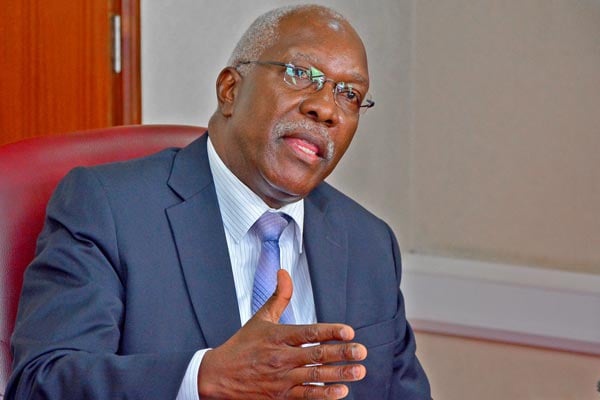Prime
Crisis mounts as pension arrears hits Shs316b mark

Auditor General John Muwanga. PHOTO/FILE
What you need to know:
- Fears. There is a threat to social security of pensioners who may retire without pension.
Data from the National Treasury indicates that thousands of employees at financially strapped parastatals run the risk of leaving without a pension because their employers failed to pay monthly contributions to the plans.
In its most recent disclosures, the Treasury states that at the end of June 2023, financially troubled state-owned enterprises had not sent in nearly Sh249.88b in employer contributions and gratuity arrear payments.
The boiling pension crisis saw a 263.66 percent increase in pension and gratuity arrears, which poses a serious threat to the social security of pensioners who may retire without a pension, according to the Public Debt and Other Financial Liabilities Framework (PDMF) of the 2023/2024 financial year.
The aforementioned figure could have been cumulative because the Auditor General (AG) mentioned in his annual report for the 2022/2023 fiscal year that pension liabilities had decreased from Shs471b in the 2021/2022 fiscal year to Shs316b in the following same period.
The figures are causing “wage bill overruns and persistent requests for supplementary funding to cater for shortfalls on salaries, pensions and gratuities, yet this is an area where numbers are certain and specific”, which is why the Treasury is concerned about how they will affect budget execution.
“The hon minister [Matia Kasaija] further explained that whereas [the] government executed several reforms to militate against the persistent supplementary requests for additional funds to cater for wage, pension and gratuity shortfalls, the reforms had not registered any significant results,” AG John Muwanga noted in his latest audit report.
Unpaid employer pension contributions rank fifth among the parastatals’ outstanding bills, following only arrears to contractors and suppliers of goods and services. This is after the Treasury cleared out Bank of Uganda securities and drastically lowered taxes and deductions.
The government’s tax and deduction arrears had increased dramatically from Shs5.66b to Shs87.93b in the year ending June 2022, but the economy managers were able to bring them down to Shs54.79b the following year.
Pension statutory instruments stipulate that “the duration within which a member shall be paid his or her benefits, in any case, payment should be made within 30 working days from the date of receipt of a member’s duly submitted application or request for payment of benefits, except in case of survivor benefits, if there is any contention; and any other conditions prescribed by the Authority.”
The National Social Security Fund (NSSF) levies a five percent penalty on the total contributions for each month or portion of a month in which an employer or employee fails to make their monthly contribution payments. However, the government has encountered challenges in maintaining sufficient cash reserves to settle the accrued pension liabilities of some of its employees. For example, records show that the Ministry of East African Community Affairs had unpaid pension arrears totalling Shs8.99b in the 2022/2023 fiscal year.
In addition, the Uganda Post Limited’s (UPL) lawsuit plea from its resentful former employers was denied by the Court of Appeal in the same financial year. The lawsuit sought Shs45b in general damages, pensions, and other financial relief.
“It was observed that the Court of Appeal delivered a Judgement against UPL wherein UPL was required to settle a total of Shs45 billion to the plaintiffs in the case involving UPL & UTCL versus Bernard Mwetise & Ors CA No. 10/2014,” a government audit shows.
With the withdrawal of a new Bill in May of last year, pensioners in Uganda will continue to protest the delay in receiving their monthly benefits.
Introduced on March 14, 2023, the Public Service Pensions Fund Bill, 2023 sought to establish a mandatory contribution system for the pensions of public employees. However, after undergoing substantial modifications in the Committee on Public Service and Local Government, the Bill was withdrawn. The proposed legislation mandated that all public employees contribute five percent of their gross salary to the pension fund on a monthly basis. The government would contribute 10 percent of the employee’s gross salary, reducing the current system’s 100 percent government contribution to the pension fund.
Similar to the NSSF, the Bill also sought to establish a public service pension fund, as well as to provide for the payment of retirement benefits to pensioners and their survivors and the collection of contributions to the fund.
The Bill additionally aimed to establish guidelines for investing funds in order to produce income.
Its withdrawal exacerbated the pain for pensioners who relied on it to receive their benefits.
The Bill was withdrawn at the request of Attorney General Kiryowa Kiwanuka. He stated that while there were no objections, the Executive would carefully review the Bill. He hastened to add that the Bill would be reintroduced when it was appropriate.
Uganda’s pension system is in dire need of reform, according to data from the Capital Markets Authority (CMA). A 2012 research paper titled A description of the Pension System in Uganda: Need for Reform, authored by David B Nyakundi from the Retirement Benefits Authority, Kenya, sketches a grim picture. CMA contends that the ever-increasing implicit pension debt in public service pension schemes, unresolved governance deficits in the NSSF, and underdeveloped private pension schemes mean that Ugandans will be unable to ensure a decent standard of living for its elderly citizens, particularly the poor.
“While pension reform is a major policy which the government should carefully consider […] it is possible for the same to be developed in phases. In the meantime, those participating in the existing schemes require confidence and a regulator could be established to help in building that much needed confidence and recommend policy on further work for pension reform strategies,” the regulatory body of capital markets notes.




